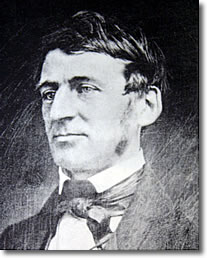Ralph Waldo Emerson, Poet & Essayist
Emerson, "the Sage of Concord," was the greatest literary figure in 19th-century America.
Ralph Waldo Emerson (1803-1882), "the sage of Concord," was the son of a Unitarian minister, founder of the Transcendentalist movement and perhaps the greatest literary figure in 19th-century America.
You can visit his home and his grave in Concord MA, and you can walk the Emerson-Thoreau Amble, a footpath from his house in Concord Center to Walden Pond.
Young Emerson
Born in Boston, Emerson attended Harvard Divinity School and in 1829 became the minister at Boston's Second Church (Second Unitarian). However, his free-thinking views were not appreciated by the congregation.
In 1832 he left his pulpit and traveled in Europe where he met Thomas Carlyle, William Wordsworth and Samuel Taylor Coleridge, and absorbed their ideas on the Romantic movement then beginning in reaction to the onset of the Industrial Revolution.
Transcendentalism
In 1834 he settled in Concord MA, began his career as lecturer and writer, and a year later married Lydia Jackson (his first wife had died in 1829), whom he called Lidian.
His seminal essay Nature, published in 1836, set out the basic beliefs of Transcendentalism: in essence, that God was in all things and in all people, and that there was a mystical unity to Nature and humankind's role on earth was to find its proper place in nature and live in harmony with it.

"Bush," Ralph Waldo Emerson's house in Concord MA.
He delivered the Phi Beta Kappa oration entitled The American Scholar at Harvard University in 1837, and summoned American academics to create and promote their own culture rather than merely follow that of Europe.
The following year, in the Harvard Divinity School Address, he taught that a person could find redemption in his own soul because of the divinity within himself. In effect, he repudiated the foundation of Christian teaching.
Because of this, he was not invited to Harvard again for nearly 30 years, but when Harvard caught up to his thinking and invited him again, it was to award him the honorary degree of Doctor of Divine Letters (D.DL.).
In 1840 he and other Transcendentalists published The Dial, a periodical that spread their philosophical ideas.
Emerson's Writings
Though he always thought of himself principally as a poet (his first collection of poems was published in 1847), it was his lectures that made him famous and influenced American literature and philosophy. They were published as Essays (1841 and 1844), Representative Men (1850), English Traits (1856), The Conduct of Life (1860) and Society and Solitude (1870).
Many Americans accept Emerson as the founder of American philosophy and literature. In any case, his essays, poems and lectures had a profound effect on American religion, literature, and society during the 19th century, and beyond.
He certainly said a lot of sage things. One of my favorites:
"The louder he talked of his honour, the faster we counted our spoons."
Emerson in Concord
You can visit Emerson's house in Concord MA, his grave on Authors' Ridge in Concord's Sleepy Hollow Cemetery, Walden Pond (where he owned land and often walked), and other Emerson sites in Concord. More

